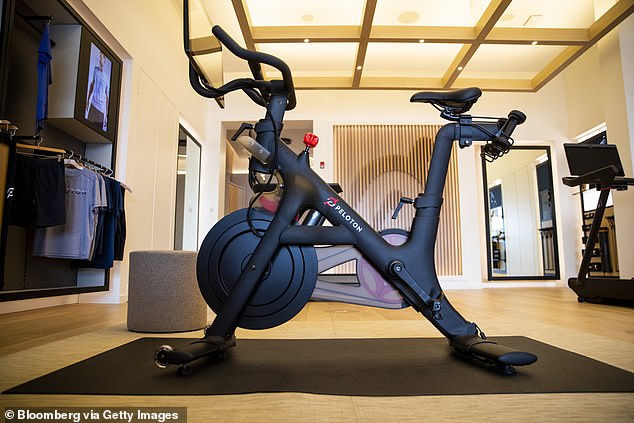Mom says her son was killed by Peloton bike in his New York City apartment
A mother is suing home sports giant Peloton in a lawsuit over the gruesome death of her son in 2022.
According to a lawsuit filed in New York, Johanna Furtado says her son Ryan died “instantly” when his bike fell on top of him while he was using it as leverage when getting up from the floor as part of an exercise program.
Johanna claims in the lawsuit that the bike fell and cut open an artery in the horrific accident that happened in January 2022, just a week before his 33rd birthday.
Furtado’s death isn’t the first involving a Peloton bike. In 2021, a 6-year-old was killed after being carried away by a treadmill, while a 3-year-old suffered a ‘brain injury’ during a similar incident. The company’s treadmill has since been discontinued.
It has been a dramatic fall from grace for the company that became a fitness darling for those working from home during the Covid-19 pandemic.
Ryan Furtado’s mother, who says her son died ‘instantly’ when his Peloton bike fell on top of him and severed an artery, is suing the company

The company, a Peloton store in Corte Madera, California, has fallen out of favor after the lockdown ended

The suit describes Furtado doing ‘Core’ training when the tragic accident happened
Last month, Peloton managed to beat sales expectations during its fiscal fourth quarter, but the fitness equipment maker reported a larger-than-expected loss, due in part to recall costs and a shift in consumer spending.
The suit describes Furtado doing ‘Core’ training when the tragic accident happened.
Before training, riders must get off the bike to perform exercises on the floor. Ryan got off the bike and performed the floor exercises. When getting up from those exercises, Ryan used the bike to help him get up,” the suit read.
Then the bike spun and hit him in the neck and face, severing his carotid artery in his neck, killing him instantly.”
His body was eventually discovered by the NYPD, the bike lying on his face when found.
The lawsuit alleges that Peloton should have “identified the foreseeable misuse where people would also use the Subject Bike to pull themselves up off the floor during a workout, creating an unknown risk of injury to the user, such as the case with Ryan.”
As part of the ‘Core’ workout, riders are asked to use the bike to facilitate stretching.

Furtado’s heartbreaking obituary published in Maui Now that he was born on the island describes his life as “thriving” and calls his death “sudden”

He was a graduate of the University of Redlands in California and was living in Brooklyn at the time of his death
Peloton bikes come with a warning on the front of the bike, according to the lawsuit, that disclaimer is not enough.
Part of the lawsuit states that the company must have multiple warnings to “adequately warn the user of injuries that may occur if the Subject Bike is used to pull itself up off the floor during a workout.”
In a answer, Peloton blamed Furtado’s death on his own negligence.
Furtado’s heartbreaking obituary published in Maui Nu, he was born on the island, describes his life as “flourishing,” and calls his death “sudden.”
He was a graduate of the University of Redlands in California and was living in Brooklyn at the time of his death.
“In his life, he loved his family, friends, travel, music, baking, games, and all things Star Wars. He loved the ocean as well as the land and found adventures wherever he could. He left us way too soon and will be loved forever,” the tribute reads.
a GoFundMe page which was set up to help Furtado’s family pay for the funeral expenses which had raised nearly $17,000.
That tribute calls him a “dear colleague, dear friend, shining star.”
“He was someone who made everyone feel welcome and special. Ryan was great at his job and excelled at friendship; he was always there for his people, of which there are many,” he continues.

Earlier this year, the company attempted to change its name to a “health company” rather than an exercise bike manufacturer

Peloton execs at the time of the company’s IPO in September 2019
There seems to be no end to the misery for Peloton.
Earlier this year, the company attempted to change its name to a “health company” rather than an exercise bike manufacturer.
“We are shifting the perception from home to everywhere, from fitness enthusiasts to people at all levels, from exclusivity to inclusiveness among all current and prospective Peloton members,” Chief Marketing Officer Leslie Berland said in a written statement in May.
The company introduced new tiered membership pricing, ranging from $12.99 to $24 per month, and said the app now offers the largest number of free lessons since its launch in June 2018.
In October, the company announced it would cut about 500 jobs, on top of the nearly 800 layoffs it made in August 2022. It also closed its distribution network in North America and shifted delivery work to third-party suppliers.
Peloton experienced incredible sales growth during the height of the coronavirus pandemic.
The New York company’s stock price multiplied more than five times in 2020 amid lockdowns that popularized the expensive bikes and treadmills among customers who pay a monthly fee to participate in interactive workouts.
Sales began to slow in 2021 as vaccines allowed people to move around more freely from their homes, including visits to the gym.
In a letter to shareholders in August, president and CEO Barry McCarthy said consumers have shifted their spending to travel and experiences, but the New York-based company is starting to see an increase in hardware sales.
McCarthy also said costs associated with a seatpost recall, announced in May, had significantly exceeded initial expectations.
“It is estimated that 15,000 to 20,000 of our 2.2 million affected members chose to pause their monthly subscriptions in the fourth quarter pending receipt of a replacement seatpost,” he added.
Peloton Interactive Inc. lost $241.8 million, or 68 cents per share, for the three months ended June 30. A year earlier, the company lost $1.26 billion, or $3.72 per share.
Wall Street claimed a loss of 45 cents per share.
McCarthy warned for the coming quarters.
“We do not currently expect free cash flow to remain positive in the next two quarters primarily due to the seasonality of our hardware sales, the timing of inventory payments, marketing spend as we invest in growth and prepare for the holiday season, and one-time costs for seat posts; but we expect to achieve this target again in the second half of fiscal year 2024,” he said.
In addition, Peloton plans to resume pre-sale of its Tread+ treadmill in the US this holiday season. McCarthy said the Consumer Product Safety Commission approved the design for a new rear guard for the product last quarter. Peloton will begin retrofitting existing Tread+ products later this year. It will install the backguard for members who request it, which is 17,000 so far.
Looking ahead to the first quarter, Peloton expects revenue in the range of $580 million to $600 million.
